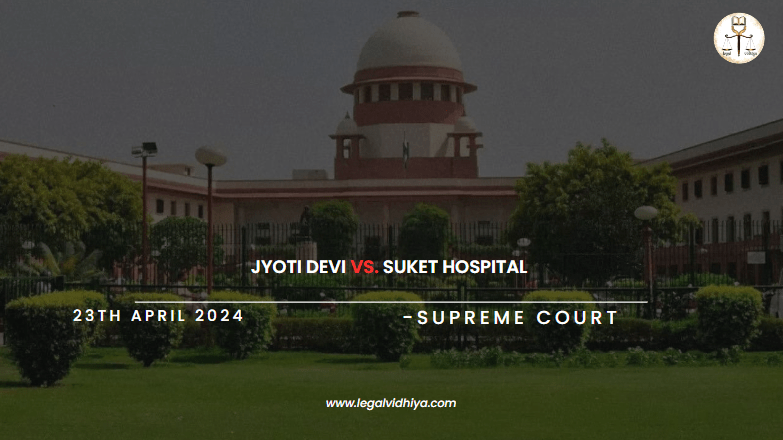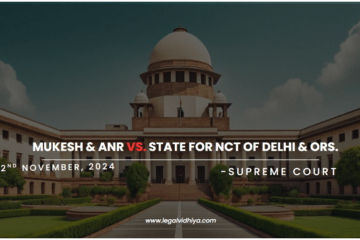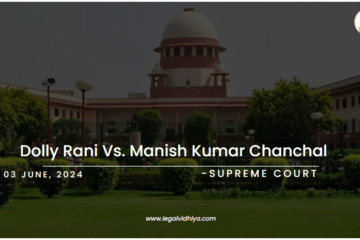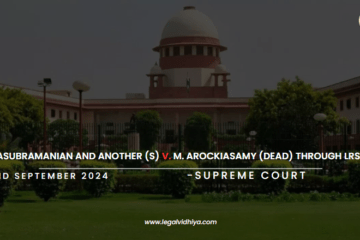
| CITATION | 2024 INSC 330 |
| DATE OF JUDGEMENT | 23th April 2024 |
| COURT | Supreme Court of India |
| APPELLANT | JYOTI DEVI |
| RESPONDENT | SUKET HOSPITAL |
| BENCH | JUSTICE: ARVIND KUMAR , SANJAY KAROL |
INTRODUCTION
A complicated legal battle involving medical misconduct and consumer rights is Jyoti Devi Vs. Suket Hospital & Ors. It starts at Suket Hospital when Jyoti Devi has what ought to have been an ordinary appendix operation. Dr. Anil Chauhan performed surgery on Jyoti Devi at Suket Hospital in Sundernagar, Mandi, Himachal Pradesh.But over the course of several years, her post-operative experience evolved into a nightmare marked by constant agony and several hospital trips. After a while, it was found that she had a foreign object—a needle—in her abdomen from the first surgery, which required more medical attention.
Jyoti Devi claimed that Suket Hospital and its medical personnel had been negligent and pursued redress through the consumer dispute resolution process. Although the lower consumer forums acknowledged the service failure and issued compensation, the amounts awarded were considered inadequate considering the severity of Jyoti Devi’s suffering and the principle of equitable compensation.
As the lawsuit proceeded through state and federal consumer dispute redressal commissions, among other appellate bodies, the legal struggle intensified. Establishing medical negligence, calculating the amount of compensation, and using legal theories like the Eggshell Skull Rule—which holds the injured party accountable for unexpected and unusual responses to wrongdoing—were the main concerns.
The Supreme Court of India was ultimately in charge of deciding the appeal, considering the available data, relevant legal precedents, and legal arguments in order to render a decision that was fair and just. This case emphasises how critical it is to protect consumer rights, guarantee accountability in the healthcare industry, and adequately compensate victims of medical malpractice.
FACTS OF THE CASE
- In 2005, Jyoti Devi underwent an apparently standard treatment at Suket Hospital for appendicitis. Her experience following surgery, though, was anything but typical. Over a four-year period, she had numerous readmissions and therapies due to ongoing pain near the surgery site. After a while, the Post Graduate Institute of Medical Science in Chandigarh conducted an investigation and found a foreign body in her abdomen—a 2.5 cm needle. This meant that more surgery was required to remove it.
- Jyoti Devi filed a claim for the expenses she incurred, amounting Rs. 19,80,000/-, as well as the physical discomfort she suffered, claiming Suket Hospital was negligent. The hospital and its employees were found to have been negligent, and the District Consumer Disputes Redressal Forum granted her an amount of Rs. 5,00,000/-. On appeal, the State Consumer Disputes Redressal Commission, however, only partially granted the appeal, lowering the award to Rs. 1,00,000/-. The compensation was increased to Rs. 2,00,000/-after a second appeal to the National Consumer Disputes Redressal Commission.
- It was determined during the court proceedings that Jyoti Devi suffered for an extended period of time as a result of post-operative care carelessness. This case emphasises how important it is to have careful medical attention as well as the legal options that customers have under the Consumer Protection Act.
- The court highlighted the tripartite elements necessary for establishing medical negligence: duty of care, duty breach, and consequent harm. It made clear that a doctor can only be held accountable for actions that are below what would be expected of a doctor of reasonable competence. The court emphasised how crucial it is to strike a balance between the claimant’s interests and the liable party’s duties. It highlighted the importance of providing appropriate, just, and equitable compensation that is suited to the particulars of each instance.
- The eggshell skull rule, which imposes liability on the injured party for damages that surpass reasonable expectations, especially in cases when the victim has a medical condition that renders them more susceptible to harm, was expounded upon by the court. This rule emphasises the idea of accepting victims as they are.
- The court provided a thorough overview of the law pertaining to medical negligence and compensation by citing numerous case precedents from various countries to demonstrate the application and interpretation of the legal principles presented.
ISSUES RAISED
- In light of the differences in compensation granted by various adjudicating authorities, how can the right amount be ascertained for the claimant’s suffering and additional medical costs?
- Did Suket Hospital and Dr. Anil Chauhan’s conduct go against the legal guidelines for medical negligence, such as the eggshell skull rule, and did they violate the duty of care outlined in the Consumer Protection Act?
- Did Suket Hospital and its medical staff follow the law and accepted medical standards, especially with regard to post-operative treatment, observing surgical protocols, and patient care guidelines?
CONTENTIONS OF APPELLANT
- The appellant claims that the surgeon and the respondent hospital engaged in blatant medical negligence. They contend that the appellant’s abdomen contained a foreign object (a needle), which caused issues and protracted pain during the surgical treatment, which should have been normal.
- According to the appellant, the respondent hospital’s post-operative care was deficient and fell short of what one would anticipate from a healthcare facility. They contend that the hospital did not adequately handle the appellant’s ongoing discomfort and post-operative problems.
- The appellant draws attention to the extended duration of suffering that resulted from the respondent’s negligence. It is emphasised that the appellant endured excruciating agony and suffering for more than five years, necessitating further medical treatments to treat problems from the initial surgery.
- As a result of the respondent’s negligence, the appellant is seeking just compensation for the financial losses, emotional distress, and bodily suffering she endured. They contend that in light of the appellant’s extreme suffering and the subpar medical treatment received, the lower courts’ award of compensation was insufficient.
- Because of their pre-existing sensitivity (the necessity for surgery), the appellant claims that the eggshell skull rule should apply in their instance and that this increased their susceptibility to the negative effects of the respondent’s carelessness. According to this legal concept, they contend, the respondent ought to bear full responsibility for the aggravating damage they produced.
- The appellant contests the lower courts’ rulings, especially those made by the State Commission and the National Consumer Disputes Redressal Commission (NCDRC), which decreased the amount of compensation granted to them. They contend that the decisions made were based on faulty logic and did not sufficiently take into account the severity of their suffering and the shortcomings in the medical system.
- According to the appellant, the lower courts’ compensation decision was excessively low considering the extent of their injuries and the length of their suffering. They are requesting a higher payout in order to fairly compensate for the suffering they have endured, both emotionally and physically, and the monetary costs brought on by the respondent’s carelessness.
CONTENTIONS OF RESPONDENT
- In response, the respondent can contend that they followed the accepted standards of care for medical practitioners and gave proper medical treatment. They could argue that there was no carelessness on their side or that the appellant’s problems were unforeseeable.
- The respondent may contend that the evidence is insufficient to demonstrate a direct causal relationship between any alleged carelessness on their side and the appellant’s injuries. The appellant’s problems could have been caused by other medical issues or other causes, according to their argument.
- The appellant’s injuries or protracted suffering may have been caused by the respondent’s acts or decisions. For instance, they can contend that the appellant sought care from other medical professionals whose activities made their condition worse or disregarded post-operative instructions.
- Even if the respondent admits some guilt, they might nevertheless argue against the appellant’s requested level of compensation. They could contend that the suggested compensation figure is exorbitant or out of proportion to the appellant’s asserted injuries.
- Invoking the defence of the statute of limitations, the respondent may assert that the appellant’s claim was filed outside the permissible time frame, contingent on the jurisdiction and timing of the legal proceedings.
JUDGEMENT
The hospital and the surgeon were found to have been negligent in the patient’s post-operative treatment and in failing to notice that the woman had a needle left in her abdomen. The Consumer Protection Act, which assists customers in receiving just compensation for subpar goods or services, served as the foundation for the ruling. Medical negligence has to be proven by demonstrating that the patient was harmed, the doctor did not perform their duties to a high standard, and the patient was not treated well. Given the anguish endured by the patient and the doctor’s error, compensation ought to be sufficient to make up for the harm. They noted the doctor would still be liable if the patient had a medical condition that made them more vulnerable to injury. The higher court increased the award to Rs. 5 lakhs in addition to additional funds for waiting and legal costs because the lower courts’ compensation was insufficient. So, the ruling made clear how critical it is to safeguard patients, hold medical professionals responsible for their actions, and guarantee victims receive just recompense.
ANALYSIS
The case examines many legal theories, primarily pertaining to the operation of the Consumer Protection Act of 1986, medical errors, determining the appropriate amount of compensation, and the eggshell skull rule.
It begins by discussing the purpose of the Consumer Protection Act, which is to assist customers who get subpar goods or services.
It then goes on to describe what must be demonstrated in order to demonstrate medical errors: that the doctor’s negligence resulted in injury.
It discusses how medical error cases are compensated, ensuring that both parties receive fair treatment.
The eggshell skull rule is the last topic covered. This states that you bear responsibility for someone’s injuries caused by your actions, even if the victim was predisposed to the injury.
It emphasises the significance of applying these legal concepts to justice decisions involving injuries and damages. The lawsuit challenges the rulings of the subordinate courts and determines to provide the injured party with further damages.
CONCLUSION
As a result of the case’s outcome, the District Forum’s ruling has been affirmed and the rulings of the higher courts, the National Consumer Disputes Redressal Commission (NCDRC) and the State Commission, have been overturned. The initial compensation amount of Rs. 5 lakhs, coupled with 9% interest from the date of the original verdict, is reinstated in this decision, which makes it noteworthy. In addition, a Rs. 50,000 litigation expense order is placed on the respondents.
The significance of the lower court’s ruling is emphasised in this conclusion, which also expresses discontent with the higher courts’ decision to reduce compensation. It also highlights the obligation of healthcare facilities to offer proper treatment as well as patients’ rights to pursue damages for carelessness and subpar treatment. All things considered, the ruling upholds patients’ rights in situations of medical malpractice and establishes standards for just compensation in those situations.
REFERENCES
- SCC Online
- https://www.the-laws.com/Encyclopedia/Browse/Case?caseId=004202033000&title=jyoti-devi-vs-suket-hospital#:~:text=In%20ordinary%20circumstances%2C%20a%20procedure,her%20appendicitis%20removed%20by%20Dr
- https://www.advocatekhoj.com/library/judgments/announcement.php
- http://indiankanoon.org/doc/8029199/
This article is written by Vedika Tiwari, student of Allahabad University, Prayagraj, intern at Legal Vidhiya.
Disclaimer: The materials provided herein are intended solely for informational purposes. Accessing or using the site or the materials does not establish an attorney-client relationship. The information presented on this site is not to be construed as legal or professional advice, and it should not be relied upon for such purposes or used as a substitute for advice from a licensed attorney in your state. Additionally, the viewpoint presented by the author is of a personal nature.




0 Comments